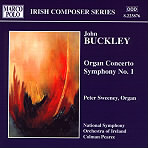This is highly spectacular music written in an accessible atonal idiom reminiscent of Dutilleux, Lutoslawski, Messiaen, and other mainstream contemporary composers. A student of Alun Hoddinott, John Buckley (born 1951) is one of Ireland’s most prominent musicians. The Organ Concerto (1992) is a powerful piece, full of sound and fury, driven by the impetuous rhythms and violent dynamic onslaughts of the solo instrument, frequently opposed to a volcanic percussion section. The overall shape retains a traditional, three-movement structure, with an intensely lyrical Adagio molto framed by two impulsive, shorter counterweights. More innovative, the Symphony No. 1 (1988) offers thickly textured passages of great expressive variety, in which sudden flashes of light illuminate darkly colored orchestration. Charged with tension, the whole piece seems to be waiting for the long-delayed, brusque resolution. Well treated by the spacious-sounding recording, this is virtuoso music that requires virtuoso performers. As far as one can tell, the National Symphony Orchestra of Ireland plays with real commitment under Colman Pearce, and organist Peter Sweeney displays an impressive capacity to rise to the music’s spectacular solo demands.
































